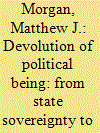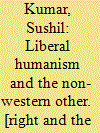|
|
|
Sort Order |
|
|
|
Items / Page
|
|
|
|
|
|
|
| Srl | Item |
| 1 |
ID:
052074


|
|
|
| 2 |
ID:
127699


|
|
|
|
|
| Publication |
Shimla, Indian Institute of Advanced Study, 2014.
|
| Description |
xv, 340p.Hbk
|
| Standard Number |
9789382396055
|
|
|
|
|
|
|
|
|
|
|
|
Copies: C:1/I:0,R:0,Q:0
Circulation
| Accession# | Call# | Current Location | Status | Policy | Location |
| 057582 | 323/KUM 057582 | Main | On Shelf | General | |
|
|
|
|
| 3 |
ID:
102827


|
|
|
|
|
| Publication |
2011.
|
| Summary/Abstract |
This article relies on cases from new EU member states in postcommunist Europe to integrate two overlapping debates about majority-minority relations. Since the Second World War, political theorists and international institutions have tended to discourage group-rights approaches in favour of individual rights; meanwhile, policy-makers who achieved interethnic peace in postcommunist Europe have often opted for group-rights approaches. On the basis of political theory, international norms and the conduct of political elites in this region, we argue that both the individual-rights and group-rights approaches can be differentiated internally along the dimension of pluralism - that is, their willingness to accommodate multiple processes of cultural reproduction. Moreover, both group-rights and individual-rights approaches can offer justifications for restricting minority cultural opportunities; furthermore, restrictive group-rights approaches sometimes cloak their efforts behind 'Western-sounding' individual-rights rhetoric. Likewise, both group-rights and individual-rights approaches can permit group accommodation that can lead to political integration. We find that de facto pluralist approaches to minority accommodation - often spearheaded by moderate parties of the majority in coalition with minority-group parties - encourage ethnic peace, regardless of their foundation in individual or group rights.
|
|
|
|
|
|
|
|
|
|
|
|
|
|
|
|
| 4 |
ID:
103888


|
|
|
|
|
| Publication |
2011.
|
| Summary/Abstract |
We live today in the world's first universal, multicultural, and multiregional system of sovereign states. Five centuries ago, emergent sovereign states were confined to Europe and contained within the bounds of Latin Christendom. Through five great waves of expansion this nascent European system globalized. The Westphalian settlement, the independence of Latin America, the Versailles settlement, post-1945 decolonization, and the collapse of the Soviet Union each brought a host of new states into the system. How can we explain these great waves of expansion, each of which saw imperial systems of rule displaced by the now universal form of the sovereign state? After detailing the limits of existing explanations, this article presents a new account of the principal waves of systemic expansion that stresses the importance of subject peoples' struggles for the recognition of individual rights. Empires are hierarchies, the legitimacy of which has been sustained historically by traditional regimes of unequal entitlements-institutional frameworks that allocate individuals of different social status different social powers and entitlements. In the Westphalian, Latin American, and post-1945 waves of expansion, which together produced most of today's sovereign states and gave the system its principal regions, subject peoples embraced local interpretations of new, distinctly modern ideas about individual rights and challenged the traditional distribution of entitlements that undergirded imperial hierarchy. Each wave differed, not the least because different rights were at work: liberty of religious conscience, the right to equal political representation, and after 1945, a compendium of civil and political rights. But in each case a "tipping point" was reached when the imperial system in question proved incapable of accommodating the new rights claims and subject peoples turned from "voice" to "exit," and each time the sovereign state was seen as the institutional alternative to empire.
|
|
|
|
|
|
|
|
|
|
|
|
|
|
|
|
|
|
|
|
|